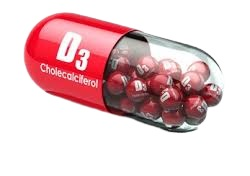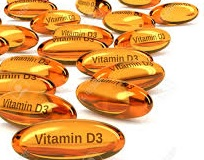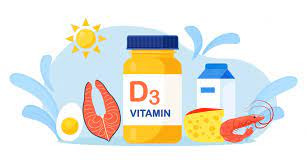
Vitamin D3 | Cholecalciferol | Use of Vitamin D3 in Pregnancy | Bone Health
Vitamin d3 Miracles, benefits and uses:

Absorption of calcium and phosphate aids by vitamin D, making it an essential nutrient. Obviously, the overall health and many more of your unborn child’s, such as bones, teeth, kidneys, heart, and nervous system, depend on it.

One can obtain Vitamin D by exposure to sunshine and it is present in some foods. To put it mildly, vitamin D is not like any other nutrient. When we expose our body to sunshine, our skin converts cholesterol into it. When we spend more time outside in the summer, our bodies produce more vitamin D than in any other season. Typically, this spans from the beginning of April until the end of September. Shade and overcast skies reduce our bodies’ ability to produce vitamin D, and window glass prevents us from absorbing any of the vitamin D outside.
Everyone has a varied optimal sun exposure duration for producing vitamin D. The time of day, the season, and your skin’s natural oils all play a role.
The amount of sun exposure required to produce enough vitamin D to fulfill the body’s needs is unknown. Sunburn and redness can be avoided by taking precautions like covering yourself or using sunscreen before going outside. You don’t have to lie in the sun for very long or expose more than your arms and face to get the benefits. Always remember to take sun safety precautions.
Existing knowledge
Vitamin D, produced when someone exposes his skin to sunlight, aids in the body’s calcium absorption, making for stronger bones and teeth. Up to half of all UK pregnant women suffer from deficiency, and the rate is higher in the winter than in the summer. Special attention should be paid when counseling women from black and minority ethnic groups, those who choose to conceal their skin, those who are overweight, and those with chronic illnesses.
Deficient pregnant women (blood serum level 50nm) are at increased risk for developing difficulties throughout their pregnancies. Bone development in deficient infants may have been stunted, and rickets may have developed in extreme situations (flexible bones). Childhood allergies have been linked to nutrient deficiency as well.
During pregnancy, what is the recommended dosage of vitamin D?

Vitamin D3 Benefits
Experts Recommend daily vitamin D supplementation at 10 micrograms (or 400 international units) for all pregnant women. Your newborn will have enough vitamin D to last for the first several months.
This advice is highly suggested for the fall and winter seasons and suggested for the spring and summer. Do not exceed the recommended daily intake of 100 mcg (4,000 IU) of vitamin D. Vitamin D supplements are also recommended for breastfeeding mothers.
There is a chance that your kid may be born with fragile bones if you do not take a vitamin d supplement throughout pregnancy. As a result, rickets may develop.
Vitamin D is included in the Healthy Start vitamins that you may receive if you qualify. Some pharmacies and child care centers also sell the Healthy Start vitamin supplement. Various vitamin D supplements may be purchased at low cost at a supermarket or local pharmacy.
The best time to get your vitamin D intake is during which trimester?

Whether you’re a kid or an adult, vitamin D is a must since it regulates calcium levels in the body. Maternal health, fetal skeletal development, and optimal maternal and fetal outcomes depend on vitamin D levels in the third trimester of pregnancy due to the increased calcium demands of both mother and child.
When pregnant, do I need to take extra vitamin D?
Vitamin D may be necessary for some women but not others. For those who may be at risk for vitamin D insufficiency, the following factors may have a larger role:
- don’t get much fresh air
- Always wear a shirt or pants to hide your skin.
- Put on a lot of sunscreens.
- Be of a darker complexion.
- To have a body mass index (BMI) of 30 or above.
Those who fall into one of these categories should prioritize getting enough vitamin D in their diet. However, unless you have been diagnosed with a deficit, you do not require more amounts.
What kinds of food are rich in vitamin D?
Vitamin D is a nutrient that is notoriously hard to obtain from diet alone, but several foods can assist. These include:
- The eggs
- fatty fish (example are: salmon and sardines)
- Beef Steaks
- morning cereals, fat spreads, and non-dairy milk replacements, albeit the amounts added to these goods may be negligible or vastly different from product to product.
Unique Benefits of Vitamin D3:
Vitamin D’s advantages aren’t limited to the skeletal system; the immune system also benefits from this nutrient, which helps the body fend off disease-causing germs and viruses. Vitamin D is used by your nerves to send information to and from your brain and helps your muscles work.
Vitamin D is crucial for both mom and baby during pregnancy since it reduces the risk of several potentially dangerous conditions.
Can insufficient vitamin D levels affect a pregnancy’s progress?
Approximately 80% of people over 65 in the United States have insufficient vitamin D levels. 4 Despite extensive prenatal vitamins; research shows that vitamin D insufficiency is frequent in pregnant women and breastfed newborns. Vegetarians, those who spend little time outdoors, and people of color (particularly those with darker complexion) are most at risk for vitamin D deficiency.
An increased risk of malignancies, autoimmune diseases, neurological diseases, insulin resistance, and cardiovascular disease is linked to low blood vitamin D levels in the general population.
Deficiency during pregnancy has been related to several negative effects for both mother and child.
Teeth are a source of calcium that is easily mobilized in women with insufficient vitamin D levels. Dr. Bayati adds that low vitamin D levels during pregnancy are linked to maternal periodontal disease. Low vitamin D levels in women, especially those who have had many pregnancies, can increase their risk of osteoporosis. The optimal development of a baby’s bones depends on the mother’s prenatal vitamin D and calcium intake and the infant’s early postnatal nutrition.
According to observational studies, low vitamin D levels may also be linked to increased risks of preeclampsia, gestational diabetes, premature delivery, and intrauterine growth restriction. Research is now focusing on potential links to asthma, bone health, allergy, and neurodevelopmental impairment concerns.
Health Benefits of Vitamin D3

vitamin D3 Health Benefits
There are several health benefits of vitamin D3, here we will enumerate some important benefits:
1. Improves skeletal and muscular health
Growth and development of skeletal muscles, as well as peak muscular strength and performance, rely on adequate levels of vitamin D and the vitamin D receptor. For the elderly, vitamin D supplementation has been shown to improve muscle performance and decrease the likelihood of falls.
2. Strengthens defenses:
The traditional effects of vitamin D on calcium and bone homeostasis are now acknowledged as just two of its many critical activities. Since the vitamin D receptor is expressed on immune cells (B cells, T cells, and antigen-presenting cells), and since these cells are also capable of generating the active vitamin D metabolite, vitamin D can function in an autocrine fashion in a local immunologic milieu. Vitamin D affects both innate and adaptive immune responses. A lack of vitamin D might increase your vulnerability to infections and the possibility of developing autoimmune. The immune cells in autoimmune illnesses are susceptible to the ameliorative effects of vitamin D, suggesting that supplementation of vitamin D-deficient patients with autoimmune disease may have benefits beyond those on bone and calcium homeostasis.
The immune system’s role is to maintain a healthy level of self-tolerance while simultaneously establishing protective immunity against foreign infections. More and more evidence point to the negative consequences of vitamin D deficiency on the immune system in recent years. There appears to be a heightened sensitivity to infection and a diathesis in a genetically sensitive host to autoimmunity in the context of vitamin D deficiency.
3. Raises one’s spirits.
The central importance of the brain cannot be overstated. A sound cognitive system is crucial for proper mood management, and specific nutrients play a pivotal role in promoting and supporting this. After doing extensive research into the link between diet and mental health, scientists have pinpointed ten nutrients—including calcium, chromium, folate, iron, magnesium, omega-3 fatty acids, Vitamin B6, Vitamin B12, Vitamin D, and zinc—that work together to fight depression and improve mood and raise spirits.
4. Helps in inflammation reduction.
Vitamin D’s active metabolite plays a role in suppressing inflammation, which may be helpful for people with severe COVID-19. New information about how vitamin D works to suppress inflammation from immune cells may provide light on reactions during severe COVID-19.
5. Heart health is enhanced
Patients with congestive heart failure may benefit from higher vitamin D consumption for a number of reasons. Supplementing with vitamin D has been linked to better cardiac function in persons with chronic heart failure, according to a study published in the Journal of the American College of Cardiology in 2016.
6. Helps to improve Erectile Dysfunction (ED)
The endocrine and immune systems, blood vessels, and endothelial function are just some of the many bodily systems that vitamin-D benefits, as suggested by the available literature. The ability of men to get and keep an erection is influenced by a number of factors and is often used as a proxy for general health. The lack of vitamin D has been linked to erectile dysfunction in epidemiological studies. This review aims to provide an interpretation of the possible mechanisms by which vitamin D regulates penis anatomy and physiology. Vitamin-D deficiency has been linked to poor erectile function. Vitamin D, in a nutshell, plays an important role in maintaining a healthy body and enhancing sexual performance.
Evidence from both the laboratory and the bedroom has established the significance of VD in maintaining an erection. In patients with ED, it is vital to monitor VD and provide necessary supplements. Supplemental vitamin D could be a low-cost, low-risk way to treat and prevent erectile dysfunction.
7. saves from cancer
Colorectal, breast, prostate, and pancreatic cancers are the ones for which the most human data are available. Numerous epidemiological studies have linked increased vitamin D consumption or blood levels to a decreased risk of colorectal cancer.
Lack of vitamin D can cause the following symptoms.
Although fatigue, sore bones, muscle weakness, and mood swings are not typically associated with vitamin D deficiency, these can be signs that something is wrong with your health.
8. Helps in treating Psoriasis
It has good effects on skin problems such as psoriasis. We can avoid many skin disease by good intake of vitamin d3.
Vitamin D insufficiency may manifest with the following signs and symptoms:
- Fatigue
- Trouble falling asleep
- Chills, fever, and a dull ache in the bones
- Sadness, or a state of depression
- Loss of Hair
- Deficiency in muscle strength
- Depression and loss of appetite
- becoming ill more frequently
To be or become white, visit your family doctor if any of these signs and symptoms sound similar. Vitamin D levels may be measured with a blood test. The results of the blood test will tell us whether your vitamin D levels are normal or too low.
Vitamin D-fortified foods
Vitamin D3 is the most abundant in fish, making it the finest natural source.
The fatty fish group includes salmon, trout, tuna, and mackerel.
Herring and sardines, among other canned seafood
- Egg Yolks
- Fish Liver oils
- liver from beef
- Animal Liver Alternatives: Fish Liver6 vitamin D fortified foods.
To make up for the dearth of vitamin D-rich foods found in nature, many manufactured goods have had the vitamin added to them. See if vitamin D has been added by checking the label.
-
- Cereals for breakfast
- Milk
- Almond milk
- Tofu milk
- Juice of oranges
- Oatmeal
Sunlight is the source of the vitamin D issue ?
Humans can produce their own vitamin D when exposed to the sun’s rays. “Apply sunscreen to exposed areas before going outside. But even a brief exposure to sunlight has positive effects on human health, “in Dr. Lacey’s words.
Having a good place to call home is important. More time in the sun is required to generate sufficient vitamin D levels if you live further from the equator (such as in the northern United States). A vitamin D supplement or higher food intake may be necessary throughout the winter months if you don’t get much sun.
Does using vitamin D3 pills pose any health risks?
Yes. At the doses typically advised, “a vitamin D pill doesn’t create many bad effects,” as Dr. Lacey puts it. You can’t really overdose on vitamin D unless you take extremely large amounts because “what you don’t use, you normally urine out.”
Vitamin D pills have been associated with a number of potential side effects, including dry mouth and bowel movements.
In addition to the aforementioned side effects, vitamin D in excess can also lead to kidney stones, nausea, disorientation, and vomiting. You should talk to your doctor before taking a vitamin D supplement since it may conflict with the drugs you are already taking.
Is vitamin D3 the same thing as vitamin D?

Obviously, Two primary types of vitamin D exist D2 and D3. Body absorbs both forms, although research shows that vitamin D3 is more successful at increasing levels. Dr. Lacey says, “I personally recommend over-the-counter vitamins that contain vitamin D3.” If you don’t want to take a tablet, you can still take a cod liver oil supplement.
“Children 1–18 years old, pregnant women, and adults 19–70 who are not pregnant have an RDA of 600 international units of vitamin D per day. Initiating a dose increase to 800 IU after age 70 is advised “, Dr. Lacey explains. An extremely high dose of vitamin D3 is available by prescription if your levels are dangerously low.
Who is more at risk for vitamin D deficiency?
While those with darker skin tones enjoy greater protection from harmful UV rays, they must spend more time in the sun in order to generate the same amount of vitamin D as those with lighter skin. Vitamin D deficiency is more common among people of African descent who are not of Hispanic origin, according to Dr. Lacey. Vitamin D production decreases with increasing skin darkening. The elderly who spend most of their time inside, those who are overweight, those who already have osteoporosis, and those who have gastrointestinal malabsorption diseases such as celiac disease or inflammatory bowel disease are also at risk for vitamin D deficiency.
Vitamin D supplements are also recommended for breastfed newborns. “Since breast milk has a negligible amount of vitamin D, infants should take in 400 IU (10 mcg) everyday until they reach 12 months of age. If a family does not wish to give their baby a supplement, the breastfeeding mother can strengthen her milk by taking a supplement “elucidates Dr. Lacey. Infants that are formula-fed will need vitamin D supplementation unless they ingest at least 1000 mL of formula per day, as “most infant formulae contain at least 400 international units/L of vitamin D.”
vitamin D cures Several diseases:
It’s great to see promising evidence that raising vitamin D levels can have a major impact on preventing and treating a wide range of diseases. Some of the most recent are as follows:
1. Treatment for cancer:
Cancers of the colon, breast, prostate, ovaries, and esophagus are more likely to occur in people who lack vitamin D and who also live at higher altitudes.
2. Diabetic control:
vitamin D replacement and supplementation avoids Types I and II of diabetes potentially.
3. Hypertension:
A recent study found that hypertensive individuals who used tanning beds for three months saw a 100% increase in their blood levels of vitamin D and a complete resolution of their hypertension.
4. Multiple Sclerosis:
Living at a greater latitude increases the likelihood of having multiple sclerosis.
5. Rheumatoid arthritis
Vitamin D levels were found to be inversely associated with rheumatoid arthritis incidence in a study conducted in 2004.
6. Obesity:
Obese persons may need larger vitamin D dosages because fat tissue may absorb vitamin D from the bloodstream.
7. Osteoporosis:
Checking the Vitamin D levels of people who have been diagnosed with osteopenia or osteoporosis is important.
8. Fibromyalgia:
Fibromyalgia is often incorrectly diagnosed in patients with vitamin D insufficiency. Substituting vitamin D for what was lost may alleviate the symptoms.
Vitamin D for Infants, Kids, and Teens:

Surely , the traditional effects of vitamin D on calcium and bone homeostasis are now acknowledged as just two of its many critical activities. Since the vitamin D receptor is expressed on immune cells (B cells, T cells, and antigen-presenting cells), and since these cells are also capable of generating the active vitamin D metabolite, vitamin D can function in an autocrine fashion in a local immunologic milieu. Vitamin D affects both innate and adaptive immune responses. A lack of vitamin D might increase your vulnerability to infections and the possibility of developing autoimmune. The immune cells in autoimmune illnesses are susceptible to the ameliorative effects of vitamin D, suggesting that supplementation of vitamin D-deficient patients with autoimmune disease may have benefits beyond those on bone and calcium homeostasis.
The immune system’s role is to maintain a healthy level of self-tolerance while simultaneously establishing protective immunity against foreign infections. More and more evidence points to the negative consequences of vitamin D deficiency on the immune system in recent years. There appears to be a heightened sensitivity to infection and a diathesis in a genetically sensitive host to autoimmunity in the context of vitamin D deficiency.
How to Help Kids Who Don’t Get Enough Vitamin D3?

Still, consume Vitamin D orally as per indications. Take Vitamin D with or without food; however, take it after a meal for best absorption. It would be best if you took alfacalcidol after a meal. It would be best if you did as it says on the packet. Discuss your concerns with your healthcare provider or pharmacist if you have any questions.
Take the drug exactly as per indications. Several things will determine your dosage, some are age, weight, response to treatment, the quantity of sun exposure, and diet.

Obviously, If taking this medicine in liquid form, measure each dose with a special spoon or other dosing instruments. To ensure you obtain the right dose, you shouldn’t use a regular spoon.
It is important to properly chew the chewable tablet or wafers before ingesting. Keep in mind that never try to ingest full wafers.
What problems does vitamin D Severe deficiency can cause?

We can link loss of bone density and lack of vitamin D, which increases risk of osteoporosis and fractures (broken bones).
Additionally, vitamin D insufficiency has links to a variety of illnesses. It can lead to a condition called rickets in young children. Simply put, rickets is an illness that causes the bones to soften and bend. Rickets is more common among African American newborns and toddlers. Severe lack of vitamin D causes Osteomalacia in adults. Bone pain, muscle weakness, and bone fragility are all symptoms of osteomalacia.

Also Diabetes, hypertension, cancer, and autoimmune diseases like multiple sclerosis are just some of the disorders for which vitamin D is being studied. Still it needs More study to determine the role of vitamin D in these diseases.
Still Severe vitamins D deficiency can cause cancer risk, especially breast cancer .
Is it good to take vitamin D Dietary supplements everyday?
Hence, It is possible to poison yourself with excessive amounts of numerous vitamins and minerals (including iron). According to the latest recommendations, adults should avoid to take more than the equivalent of 100 micrograms per day. However, we do not need vitamin D on daily biases because it is a “fat-soluble” vitamin and our our body can store it for months and enables us to lead a healthy living also. Studies also, suggest that that Vitamin d3 deficiency can lead to bone density. Vitamin D3 resultantly improves bone health and improve muscle weakness also.
Do you know if vitamin D can make your skin darker?
Despite its importance, vitamin D’s principal function is to promote melanin synthesis, which may lead to even more skin darkening. So, We can correlate Serum vitamin D levels with skin color,
Surely, we can associate darker skin becomes when we observe lower level of vitamin D3.
Vitamin D Deficiency:
We can link loss of bone density to an increased risk of osteoporosis and fractures (broken bones). Additionally, vitamin D insufficiency has been linked to a variety of illnesses. It can lead to Rickets in young children. In the extremely rare case of Rickets, the bones become pliable and soft. Some time.
Different parts of the body rely on vitamin D in order to operate properly. Vitamin D can be obtained in small amounts through food sources, but sun exposure is the primary source. The vitamin D the body takes in must be converted to the active form before it can be used.
A deficiency can develop either when an individual does not consume enough vitamin D or when their skin is unable to produce enough vitamin D through sun exposure. A deficiency can also develop if the body has trouble absorbing the vitamin or converting it to its active form in the liver and kidneys.
Problems with the bones and muscles, in particular, can arise from insufficient vitamin D levels.
Should I Take vitamin D Supplements?
Bone abnormalities like rickets in children and osteomalacia in adults can result from insufficient vitamin D intake. The government recommends that all citizens take a vitamin D supplement each day from fall through spring.



